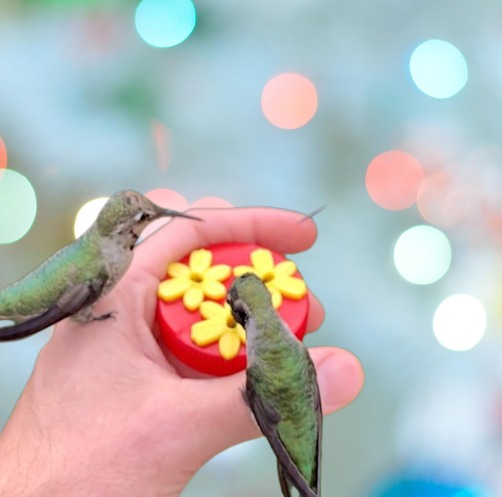Hummingbird Go Without Food? Hummingbirds can usually survive for 4 to 6 hours a day without eating food. Tragically, from that point onward, they are in danger of starving to death. Albeit that may not seem extremely lengthy, it is fundamental to see exactly how much energy hummingbirds use over the day!

How long could a hummingbird at any point do without eating?
Hummingbirds are eminent for their small size and unimaginable energy necessities. Yet, exactly How Long Can a Hummingbird go without food? The response lies in their wonderful digestion.
Hummingbirds have one of the best metabolic rates among all animals, and that infers they need to eat consistently to help their energy levels. Overall, a hummingbird can manage without sustenance for about 8 to 12 hours during the night when they enter a state of dormancy, toning down their processing to direct energy. In any case, postponed fasting every day can be blocked to their prosperity and perseverance.
Do hummingbirds have to eat around evening time?
While hummingbirds essentially feed during the day, they don’t regularly take care of around evening time. All things being equal, they enter a condition of lethargy, a kind of profound rest portrayed by a critical drop in metabolic rate and internal heat level.
During slowness, hummingbirds monitor energy by decreasing their physiological exercises, including taking care of. This versatile instrument assists them with enduring cold evenings or times of food shortage when nectar sources are inaccessible.
Might hummingbirds at any point purge a feeder in one day?
Hummingbirds have insatiable cravings and striking taking care of abilities, frequently consuming enormous amounts of nectar to fuel their high-energy way of life. While it’s extraordinary for a singular hummingbird to cleanse a feeder in one day, it’s not mind-boggling, especially during top dealing with times when nectar sources are limited.
Factors, for example, how much hummingbirds visit the feeder, the size of the feeder, and the social occasion of sugar in the nectar can impact how rapidly a feeder gets drained.

How long can a hummingbird go without eating?
While considering the topic of how long can a hummingbird go without food, one dives into the complex universe of avian physiology. These little animals, with their quick digestion and persevering energy consumption, depend intensely on a predictable admission of sustenance to fuel their surprising accomplishments.
Be that as it may, notwithstanding their insatiable cravings, hummingbirds have advanced captivating variations to adapt to times of food shortage. All in all, how long can a hummingbird go without food before surrendering to the requests of its high-energy way of life?
How long do hummingbirds live?

The life expectancy of a hummingbird fluctuates relying upon variables like species, natural surroundings, and individual well-being. By and large, most hummingbird species live for around 3 to 5 years in the wild, albeit some might live longer in ideal circumstances.
In any case, death rates among youthful hummingbirds are high, with many capitulating to predation, mishaps, or natural difficulties during their most memorable year of life.
Furnishing a reasonable territory with bountiful food sources and limiting dangers can assist with expanding the possibilities of hummingbirds living longer, better lives.
What might I do for a ravenous hummingbird?
As human improvement keeps on infringing on regular territories, giving supplemental food sources can be advantageous for hungry hummingbirds, particularly during times of food shortage or natural pressure.
One method for aiding is by keeping up with perfect and very much-supplied feeders loaded up with new nectar. Select feeders with brilliant varieties and various taking care of ports to draw in hummingbirds.

Furthermore, establishing local blossoms wealthy in nectar can give a characteristic food source to these surprising birds. By establishing a hummingbird-accommodating climate, you can assume a crucial part in supporting their endurance and prosperity.
Adaptations for Energy Conservation:
Hummingbirds have developed striking variations to moderate energy, particularly during times of food shortage. One such variation is their capacity to enter a condition of lethargy. Slowness is an impermanent physiological state portrayed by a huge lessening in metabolic rate and internal heat level. By entering lethargy, hummingbirds can monitor energy when food sources are restricted.
During lethargy, a hummingbird’s metabolic rate can diminish by up to 95%, permitting them to monitor indispensable energy savings. This energy-saving system is fundamental for hummingbirds’ endurance during the evening or when food is scant. By decreasing their metabolic rate, hummingbirds can keep up with their energy levels and make due until they can track down more food.
Notwithstanding lethargy, hummingbirds likewise depend on their fat stores to support them during periods without food. Before setting out on lengthy transitory excursions or during seasons of food shortage, hummingbirds will expand their fat stores to give them a wellspring of energy. These fat stores can support them for a few days, permitting them to get by until they can recharge their energy saves.
By and large, hummingbird energy preservation transformations, such as slowness, and fat stockpiling, empower them to endure periods without food. These wonderful physiological components feature hummingbirds’ versatility and capacity to flourish in testing conditions.
The Role of Fat Reserves:
Fat stores play a pivotal part in supporting hummingbirds during periods without food. Before setting out on lengthy transitory excursions or during seasons of food shortage, hummingbirds will expand their fat stores to furnish them with a wellspring of energy.
These fat stores act as an imperative energy source that hummingbirds can use when nectar or bugs are scant. By using fat, hummingbirds can support themselves for expanded periods without food, empowering them to get by until they can track down greater sustenance.
Fat stores are particularly significant for hummingbirds during seasons of expanded energy use, like movement or rearing. By developing their fat stores ahead of time, hummingbirds can guarantee they have sufficient energy to fuel their exercises and back up their physiological requirements.
By and large, fat stores assume a basic part of hummingbirds’ capacity to endure periods without food. By putting away overabundance of energy as fat, hummingbirds can support themselves during seasons of shortage and keep on flourishing in their current circumstance.
Factors Influencing Survival Without Food:
A few elements can impact how long can a hummingbird go without food. One of the essential variables is the type of hummingbird. Bigger species ordinarily have more noteworthy fat saves and might have the option to endure longer periods without food contrasted with more modest species.
Ecological circumstances likewise play a huge part in deciding a hummingbird’s capacity to track down food. Factors like temperature, moistness, and food accessibility can affect their capacity to find nectar sources. During times of dry season or when blossoms are scant, hummingbirds might battle to track down sufficient food to support themselves.
Moreover, individual well-being and physiological conditions can impact a hummingbird’s capacity to make do without food. Hummingbirds that are in chronic frailty or have hidden ailments will be unable to endure extended periods without food as well as sound people.
At long last, human mediation can likewise impact a hummingbird go without food. Furnishing supplemental taking care of stations with nectar or sugar water can assist with supporting hummingbirds during seasons of food shortage. how long can a hummingbird go without food? Making natural surroundings upgrades, for example, establishing local blossoms or introducing water basins, can likewise give extra food sources to hummingbirds.
By and large, a few elements, including species, natural circumstances, individual well-being, and human intercession, can impact a hummingbird go without food. By understanding these variables and doing whatever it may take to help hummingbirds during seasons of food shortage, we can assist with guaranteeing their well-being and prosperity.
FAQs
How long can a hummingbird go without food?
Hummingbirds can regularly get by for a few hours without food, because of their high metabolic rate. In any case, during times of food shortage, they might enter a condition of slowness to monitor energy and expand their endurance time.
What is torpor, and how does it help hummingbirds survive without food?
Lethargy is a condition of diminished metabolic movement and diminished internal heat level that hummingbirds enter to monitor energy. During lethargy, their metabolic rate dials back essentially, permitting them to preserve indispensable assets and endure periods without food.
Do hummingbirds rely solely on nectar for food?
While nectar is an essential wellspring of nourishment for hummingbirds, they likewise consume bugs and little insects to enhance their eating regimen with protein and other fundamental supplements.
What should I do if I find a hummingbird that appears weak or injured?
If you experience a hummingbird that seems frail or harmed, contact a nearby natural life rehabilitator or veterinarian for help. They can give master care and restoration to help the hummingbird recuperate and get back to nature.
Can I feed hummingbirds, honey, or artificial sweeteners?
It isn’t prescribed to take care of hummingbird honey or counterfeit sugars. Honey can advance contagious development in hummingbird feeders, prompting potential medical problems just plain silly. Counterfeit sugars come up short on essential supplements tracked down in normal nectar and may not give satisfactory sustenance to hummingbirds.
Conclusion
In Conclusion, the subject of how long can a hummingbird go without food is perplexing and impacted by different elements. Through their momentous transformations for energy preservation, dependence on fat stores, and capacity to enter a condition of lethargy, hummingbirds exhibit mind-boggling strength despite food shortage.
As experts in hummingbird care and preservation, it’s fundamental to furnish these great animals with a territory wealthy in nectar sources and to help endeavors to safeguard their regular habitats. By getting it and valuing the novel science of hummingbirds, we can guarantee their proceeded with endurance and have a great time with their excellence for a long time into the future.
Read More Birds and Hydration: How Long Can Birds Go Without Water? Best Guide
